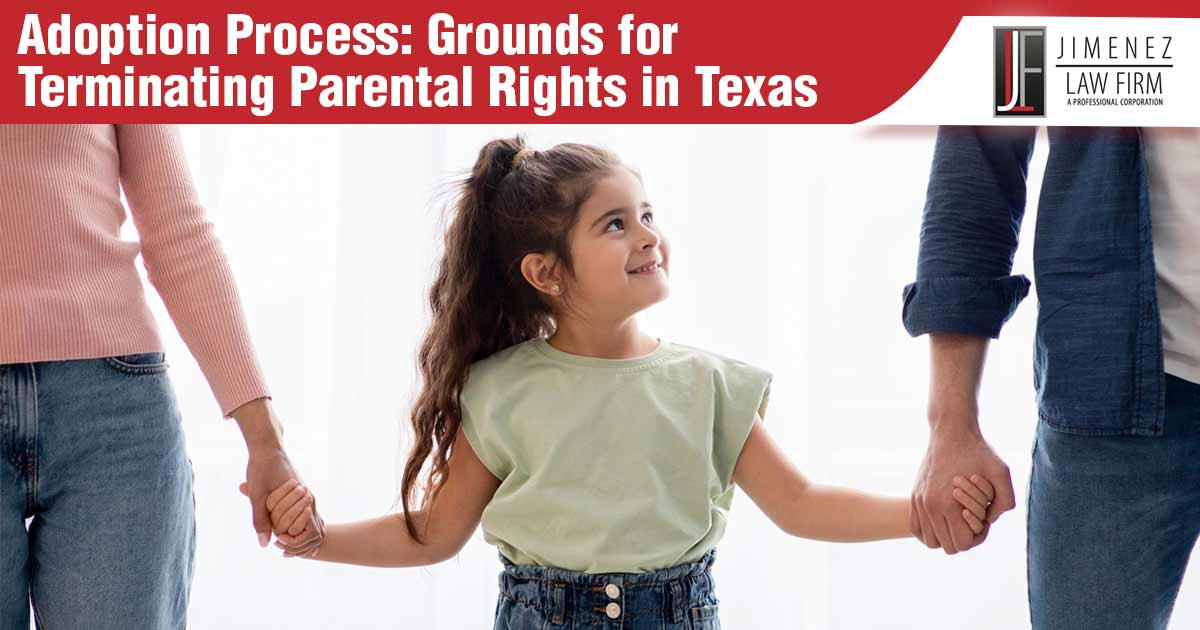It’s not uncommon these days to see blended families. Couples marry and bring children from previous relationships. In some cases, the stepparent may wish to adopt the stepchild. There are also instances where a couple may wish to adopt a child that isn’t one of the spouse’s biological children. Regardless of the adoption circumstances, before any adoption can occur, the previous parents’ parental rights to the child must be terminated. The professional and experienced staff at The Jimenez Law Firm is here to help. We’ll cover the process of terminating parental rights in Texas and hopefully answer any questions you may have regarding the termination of parental rights.
What is Termination of Parental Rights in Texas?
Parental rights termination is a legal process. It happens when the court puts an end to the relationship between either a parent or both parents and the child. The parent or parents will then have no legal rights to the child once their parental rights are terminated.
Parental rights are only ever truly terminated by a court order. However, a parent can sign what is known as an “affidavit of voluntary relinquishment” of their parental rights. This typically occurs when the parent is in agreement that they should terminate their parental rights for their child or children. Similarly, the parent can also sign a document called an “affidavit of waiver of interest” if the parent agrees to give up any interests they have in the born or unborn child. Yet, even with these signed affidavits, it is not considered a voluntary termination until a judge officially signs the court order.
Who Can File to Terminate a Parent’s Rights?
Either parent may file for a termination of parental rights case. However, this is not an easy process. There are specific legal requirements you must meet if you’re the filing parent. It’s also in your best interest to do this with a qualified attorney. If you are not the parent of the child, you are only able to file if you meet the following circumstances:
- You have court-ordered visitation or access to the child from another state or country
- You’re a man who alleges he is the child’s father
- You are the child’s foster parent, and the child was placed in your care by DFPS for a minimum of 12 months which ended no more than 90 days prior to the date you file
- You’re a prospective adoptive parent who has been given standing under a statement to confer standing
- You are the grandparent, great-grandparent, sibling, aunt, uncle, niece, or nephew and:
- Both of the child’s legal parents are deceased
- Either both parents, a surviving parent, or the managing conservator agree
- Present circumstances may result in significant harm to the child’s emotional development or physical health
- You’ve had care, control, and possession of the child or children for a period of a minimum of 6 months which ended no longer than 90 days prior to your file date
- You’re the designated and managing conservator for the child or have written consent to adopt the child
- You’ve lived with the child and the parent, guardian, or conservator of the child for at least 6 months which ended no more than 90 days prior to your file date, and that the parent, guardian, or conservator has passed away
These agencies and representatives may also file for the termination of parental rights:
- The guardian of the estate or the child’s person
- An authorized representative of the child such as a guardian or attorney ad litem
- A government entity
- A licensed child-placing agency
- The Department of Family and Protective Services
A case for the termination of parental rights can be filed before or after a child is born. Typically, the reason for filing affects the termination timeline. It’s important to have an experienced attorney who understands the various circumstances regarding these types of cases. Your family law lawyer will be able to explain your rights and options for the best interests of the child.
Can I Give up My Rights?
Occasionally, complex issues may result in one parent wishing to give up their rights. The Texas courts focus on the best interests of the children. This means they are interested in the future emotional and physical needs of the child. Most Texas Family Law Courts are hesitant to allow parents to voluntarily give up rights to their child or children. If you want to give up your parental rights, then you’ll want to speak with a family law attorney. They will discuss your options and may help you file the petition to the court for the judge to review and decide on.
What are the Reasons to Terminate a Parent’s Rights?
There are certain circumstances that may lead to the involuntary termination of the parent-child relationship. These terminations occur without an agreement and include the following grounds:
- The biological parent or legal parent abandons the child, did not support the child, and expressed no intent to return to the child.
- The parent neglected or abused another child
- The parent endangered the child
- The parent kept the child out of school or away from home
- The parent engaged in criminal conduct
- The parent is imprisoned and is unable to care for the child for a period of two or more years
- The parent is otherwise unfit
What Criminal Acts Can Cause a Parent’s Rights to be Terminated?
There are some criminal acts that can cause a parent’s rights to be terminated involuntarily.
- If the court finds the parent is criminally responsible for the serious injury or death of a child including:
- Indecency with a child
- Assault
- Sexual Assault
- Injury to a Child, Elderly, or Disabled Individual
- Possession of Child Pornography
- Promotion of Child Pornography
- Continuous Sexual Abuse of a Child, Elderly, or Disabled Individual
- If the court finds that the parent is convicted of:
- The murder of the child’s other parent
- Attempted murder of the child’s other parent
- Solicitation to commit murder of the child’s other parent
- Sexual assault of the child’s other parent
What if I’m afraid for my safety or for the safety of my children?
If you feel as though your children are not safe or if there has been any violence in the home, or sexual assault, then it’s important to get help right away. If there is an emergency, then call 911. You can also call the following numbers for non-emergency situations:
- Crime Victims – 888-343-4414
- Family Violence Legal Line – 800-374-4673
- Legal Aid for Survivors of Sexual Assault – 844-303-7233
- National Domestic Violence 24-Hour Hotline – 800-799-7233
Is the Parental Rights Termination Required Prior to Adopting a Child in Texas?
Before a child is eligible for adoption, the Texas family court must terminate the parent-child relationship between any living parents and the child in question. However, there are two circumstances where this is not required for adoption.
In cases of stepparent adoptions, the biological father or mother who joins with the stepparent as the petitioner for a stepparent adoption case does not need their parental rights terminated. The only rights terminated in this case are those of the other parent who isn’t married to the stepparent.
Also, in the case of adult adoptions, there is no requirement of parental rights termination.
Do I Need a Lawyer for my Termination of Parental Rights Case?
It is strongly recommended that you find a qualified attorney for any case regarding either voluntary or involuntary terminations of parental rights, child custody, child support, legal custody, full custody, and custody disputes in general. The adoption process can be complex and it’s a good idea to hire an attorney familiar with adoption law and the Texas Family Code.
Reach out to the professionals at The Jimenez Law Firm for questions regarding adopting from foster care, as foster parents, stepparent adoption, and the termination of parental rights. We’re also extremely knowledgeable in cases of divorce, child custody, child support, and much more. Call today to schedule a consultation.


